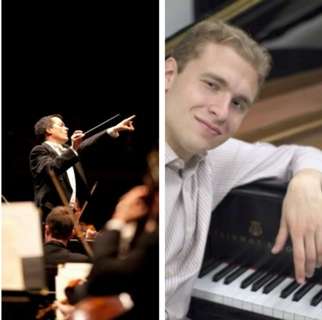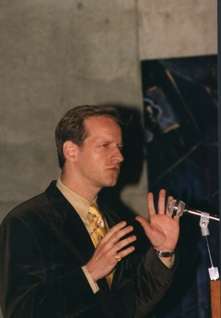|
Back
Gentle Flowers in the Garden State New Jersey
Newark (New Jersey Performing Arts Center)
11/30/2013 - & November 29, 2013 (Princeton, NJ), December 1 (New Brunswick, NJ), 2013
Béla Bartók: Concerto for Orchestra
Maurice Ravel: Piano Concerto in G Major
Lowell Liebermann: Barcarolles for a Sinking City (World Premiere)
Adam Golka (Pianist)
New Jersey Symphony Orchestra, Jacques Lacombe (Conductor)

J. Lacombe/A. Golka (© Steve Rosen/www.adamgolka.com)
Appropriately, the New Jersey Symphony Orchestra has an audience overwhelmingly from its state of residence, but New Yorkers who venture out to Newark or Princeton or New Brunswick usually get far more than the usual provincial choice. Rare is the orchestra anywhere (including New York) which can essay so successfully Sir Michael Tippett’s Fourth or Kurt Weill’s First Symphony or which enlists Marc-André Hamelin to play the Busoni Piano Concerto.
All of this, though, does Quebec-born Jacques Lacombe achieve with his ensemble. His conducting is not only electrifying, and his short introductions enlightening, but he is a firm advocate of contemporary music, especially that of New Jersey itself, like last night’s composer. Lowell Liebermann.
(While New Jersey may be limiting a bit, perhaps Mr. Lacombe can find the right composer to do with Springsteen and Bon Jovi what Philip Glass did with the music of David Bowie.)
The concert last night, besides Mr. Liebermann, had two 20th Century hallmarks, one played by a Texas-born pianist who was barely born before the second millennium. In fact, the 26-year-old Adam Golka is making quite a name for himself, playing with at most of the festivals, with American orchestras and (to make his Polish-born parents proud) the Warsaw Orchestra.
Last night, the New Jersey Symphony was not up to its best. For some reason, a kind of lassitude enveloped the first movement, though Mr. Golka pulled through the jazzy finale with more than aplomb. But in that Ravel nocturnal second movement, where he could show exactly how Ravel can be played.
Nobody performs it Adagio assai, nor should they. The piece exists on its own dreamy improvisational lines, and Mr. Golka, with an inner intensity performed with a soothing gentleness.
After the break, the orchestra was in better form for the Bartók Concerto for Orchestra, where finally all the duets, solos and ensembles were given a lift by Mr. Lacombe at his best.

L. Liebermann (© www.lowellliebermann.com)
The opening work was from Lowell Liebermann, whose “new tonal” music has been celebrated with great popularity for the last few decades. His competence, experience, sense of lyricism and excellent craftsmanship is worthy of admiration. The commission for this new work, though, was as much a matter of demographics as deftness, for he does live in the Garden State so qualifies for the “New Jersey Project.”
The Barcarolles for a Sinking City, though, was not a metaphorical image of New Jersey’s more questionable metropolises, but refers to Venice. And while most of us identify the music of Venice with Mahler’s Adagietto from Visconti’s lovely (if lugubrious) Death in Venice, Mr. Liebermann certainly had a wide span of subjects to fill his four-movement 17-minute work.
He didn’t touch on Monteverdi or Vivaldi or Gabrielli, never worked with Venice’s queenly political reign opposing (and allying with) the Byzantine and Ottoman empires, and his second-movement humor was not up to Robert Benchley’s telegram when visiting the city (“STREETS FLOODED PLEASE ADVISE”)
Rather, Mr. Liebermann played around with visitors to the city. Liszt’s homage to Wagner’s death in Venice, Am Grabe Richard Wagners, a bare two pages, was the longest section, the first “Funeral Gondola”. Alas, it began with a seemingly unintended burp from the opening French horn, and the rest wasn’t terribly effective. (Also, my mind was on the Venetian funeral cortege from the scariest movie in the history of film, Nicholas Roeg’s Don’t Look Now)
This was followed by Mr. Liebernann’s little Venetian game, Quodlibet, with hints of music interrupting Offenbach’s famous barcarolle. I wish I could have identified those works, but they flitted by too quickly. The audience felt the inclusion of the Hoffmann theme was quite amusing, but it seemed a little too stolid. The following ostinato had some beautiful orchestral effects, as did the ravishing orchestral climax in the Forgotten Barcarolle.
I was not enamored of the music, whether Venice is sinking or not.. But then, begging pardons, the history of Venice, deserves music deeper and more moving and more intense than Mr. Liebermann provided last night. He is a fine technician, and the music showed an accomplished artisan at work. At times, though, a subject needs more than a craftsman to transport that inner soul to outward life.
Harry Rolnick
|